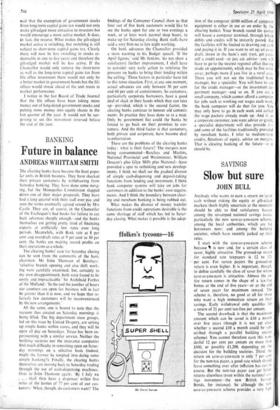Future in balance
BANKING ANDREAS WHITTAM SMITH
The clearing banks have become the least popu- lar units in British business. They have shocked their private customers by withdrawing from Saturday banking. They have done some merg- ing, but the Monopolies Commission slapped down one of their major proposals. They have had a long quarrel with their staff over pay and seen the terms eventually agreed vetoed by Mrs Castle. They are, of course, in the Chancellor of the Exchequer's bad books for failure to cut back advances sharply enough—and the banks themselves are getting pretty tired of financing exports at artificially low rates over long periods. Meanwhile, with Bank rate at 8 per cent and overdraft rates at 9 per cent to 10 per cent, the banks are making record profits on their operations as a whole.
The clearing banks' case for Saturday closing can be seen from the comments of the bank chairmen. Mr John Thomson of Barclays: `selective branch opening and also shift work- ing were carefully examined, but, certainly to my own disappointment, both were found to be costly and impracticable.' Sir Archibald Forbe\ of the Midland : 'In the end the number of hours our counters are open for business will in fact be greater than it is now, and we hope that re- latively few customers will be inconvenienced by the new arrangements.' .
All the same, one is bound to note that the vacuum thus created on Saturday mornings is being filled. The big department store groups, led on this issue by United Drapery, are setting up simple banks within stores, and they will_be open all day on Saturdays. Tesco has been ex- perimenting with a similar service. Neither the building societies nor the insurance companies find much difficulty in remaining open on Satur- day mornings on a selective basis (indeed, might the former be tempted into doing some simple banking?). Finally, the clearing banks themselves are moving back to Saturday trading through the use of cash-dispensing machines. Over to John Thomson again: `By 1 July we . . shall then have a dispenser within five miles of the homes of 77 per cent of our cus- tomers.' What, though, do customers want? The findings of the Consumer Council show us that four out of five bank customers would like to see the banks open for one or two evenings a week, or at least work normal shop hours, to make up for Saturday closing. Bank staffs have said a very firm no to late night working.
On bank advances the Chancellor provided a stern warning in his Budget speech. 'If the April figures,' said Mr Jenkins, 'do not show a satisfactory further improvement, I shall have to consider very early action to reinforce the pressure on banks to bring their lending within the ceiling.' Three factors in particular have led to this tense situation. First, at any one moment, actual advances are only between 50 per cent and 60 per cent of commitments. So customers, particularly corporate borrowers, have a good deal of slack in their hands which they can take up—provided, which is the second factor, the clearing banks continue to honour old commitT ments. In practice they have done so to a man. Only by government fiat could the banks be forced to go back on their promises to cus- tomers. And the third factor is that customers, both private and corporate, have become deaf to exhortation.
These are the problems of the clearing banks today : what is their future? The mergers now being consummated—Barclays and Martins, National Provincial and Westminster, William Deacon's plus Glyn Mills plus National—have provided a spur to rethinking and new develop- ments. I think we shall see the gradual divorce of simple cash-dispensing and deposit-taking functions from lending and investment. I think bank computer systems will take on jobs for customers in addition to the banks' own require-. ments. And I think the boundary between clear- ing and merchant banking is being rubbed out.
What makes the divorce of money transfer functions from credit operations desirable is the same shortage of staff which has led to Satur- day closing. What makes it possible is the adop-
tion of the computer (£100 million of computer equipment is either in use or on order l$y the clearing banks). Your branch round the Omer will house a computer terminal, through trhick debits and credits will be instantly posted!. But the facilities will be limited to drawing oak cash and paying it in. If you want to set up arover. draft, invest in the bank's unit trust, get.your- self a credit card-6r just ask advice—you wilt have to go to the nearest regional office (having made an appointment), which may be five miles away; perhaps more if you live in a rural area. There you will not see the traditional' bank manager, but a specialist. You will have to ask for the credit manager—or the investment de- partment manager—and so on. If you are a small company, which cannot afford a computer for jobs such as working out wages each.week, the- bank computer will do that for lrou. You may only have to go in each week and collect the wage packets already made up. And if, as a corporate cnstomer,"you want advice or credit, a specialist department will also provide it—. and some of the facilities traditionally provided by merchant banks. I refer to medium-term credits, flotations of equity, advice on mergers. That is clearing banking of the future—or it should be.










































 Previous page
Previous page